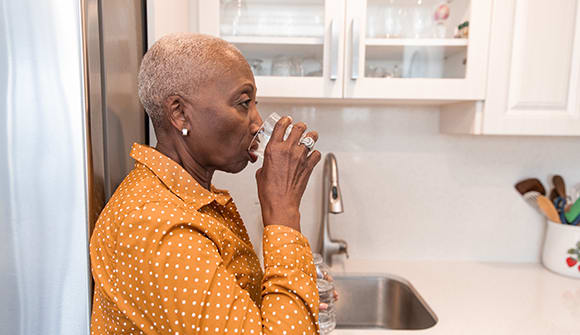Staying sober
"Dry January" is when most try it, but you can do it anytime.
Article Author: Johnny Woodhouse
Article Date:

The new year brings a fresh start for people to get their health on track. For many, that includes stepping away from booze for so-called “Dry January.”
What are the benefits of temporary sobriety?
Sparked by Emily Robinson, a British woman who gave up alcohol to train for a half-marathon in January 2011, “Dry January” has become an international movement, with millions of people participating in the public health campaign each year.
A month off alcohol can have many health benefits, including lower blood pressure and cholesterol, lower diabetes risk and reduced levels of cancer-related proteins in the blood.
“I would agree that not drinking for a month can lead to improved sleep, mind clarity and even weight reduction,” said Emily Durik, LMHC, a licensed mental health counselor with Baptist Behavioral Health.
Who should participate in a "dry" month?
Abstaining from alcohol for an entire month isn’t for everyone, especially people with drinking problems.
“I wouldn’t recommend this for anyone suffering from severe alcohol dependence,” said Durik. “When embarking on any behavior change for the new year, I encourage my clients to take a broader approach, not just in their drinking behavior.”
How to prioritize sobriety
When it comes to taking a break from alcohol, Durik recommended a holistic approach by:
- Reconnecting with one’s spiritual side.
- Getting a better handle on physical health.
- Spending more time deepening relationships with others.
Durik specializes in treating patients as a whole by offering effective tools to challenge cognitive thoughts and regulate emotions and the body’s nervous system.
Here are a few ways to help put these recommendations into action.
Consider participating in "Dry January" (or any month)
Talk to your primary care physician about abstaining from alcohol for the entire month as a personal challenge or health initiative. Your provider may recommend additional lifestyle changes to help you reach your health goals.
Evaluate personal drinking habits
Take inventory of how many drinks you have per week. Reflect on your relationship with alcohol and whether a break from drinking could have positive effects on your physical and mental well-being.
Practice mindfulness
Stepping away from alcohol can help improve mental clarity.
“Mindfulness is learning to focus on the present moment, while calmly connecting to one’s thoughts, emotions and behaviors,” said Durik. “Mindfulness is an example of incorporating healthier coping skills into our daily lives. That way, we can become more aware of choices and coping mechanisms.”
Engage in activities without alcohol
Try swapping a night out with friends at the bar for a group trip to the movies. Looking for digital support? You can follow other people taking part in “Dry January” (or year-round sobriety) on social media.
Save alcohol for special occasions
Challenge the notion that alcohol has to be part of weekly life and consider saving it for special occasions. After some time, you may even find yourself wanting to celebrate special events sans spirits.
Get support for sobriety
People with alcohol addictions need support beyond a month without drinking. If you think you have drinking or other dependency problems, consult with professionals before attempting significant changes in habits. Baptist Behavioral Health can provide you with the support you need. Call 904.376.3800 to schedule an appointment or find a provider near you.
Additionally, Baptist Health’s Collaborative Care Model embeds behavioral health professionals in select Baptist Primary Care offices. To learn more or find a provider near you, click here or schedule an appointment online.



